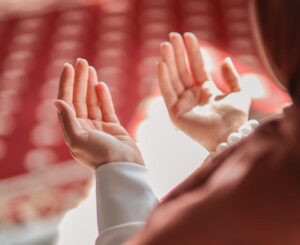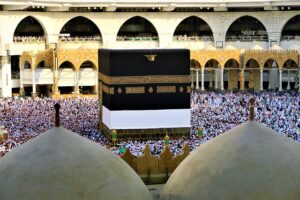Starting your day with a whisper of gratitude or closing your eyes in a moment of need—making dua is a profound expression of faith and reliance on the Divine. It’s in these quiet moments of heartfelt supplication where we share our deepest hopes, fears, and dreams with our Creator.
We’ll explore the power of dua, delving into not only its significance but also the beauty and tranquillity it brings into our daily lives.
Whether you’re seeking solace, guidance, or a way to express thankfulness, understanding how to make dua can transform your spiritual journey, making each prayer a bridge that connects your heart to the heavens.
What Is a Dua in Islam?

In Islam, dua (du’a) is essentially an act of supplication or invocation. It is a direct form of communication between a person and Allah (SWT), where one expresses their needs, desires, or gratitude, often in a personal, conversational style.
Unlike structured prayers like the five daily Salah, which follow specific rituals and recitations, dua is flexible and informal. It allows for personal expression in one’s own words, at any time and in any place.
Dua holds a special place in Islamic practice as it embodies the spiritual relationship and dependence of humans on their Creator. It reflects the belief that Allah (SWT) is always near, ready to listen, and capable of fulfilling the supplications of the faithful.
Making dua is seen as not just a way to ask for help or thankfulness but also as an act of worship in itself, acknowledging Allah’s power and mercy.
Why Do Muslims Make Dua?
Muslims make dua for several deeply rooted reasons that underscore their faith and daily lives:
- Seeking Guidance and Assistance: One of the primary reasons Muslims turn to dua is to seek Allah’s guidance and help in times of need. Whether facing difficulties, making important decisions, or needing support, dua is a way to request divine intervention and wisdom.
- Expressing Dependence on Allah (SWT): Making dua is an act of acknowledging one’s dependence on Allah. It is a humble acceptance that Allah is the sustainer and controller of all that exists, and only He can provide relief and fulfill needs.
- Spiritual Connection and Communication: Dua serves as a direct communication line with Allah. It is a personal, intimate way to converse with God, express feelings, hopes, and fears, and maintain a spiritual connection.
- Cultivating Patience and Trust: Through dua, Muslims cultivate patience and trust in Allah’s timing and wisdom. It reinforces the belief that Allah knows what is best and will respond to prayers in the way that is most beneficial, even if it is not the immediate fulfillment of one’s desires.
- Thankfulness and Gratitude: Dua is not only for asking for something but also for expressing gratitude. Muslims use dua to thank Allah for His blessings, which helps cultivate a positive and thankful mindset.
Overall, dua is a fundamental practice in Islam that enriches the believer’s spiritual life, provides comfort and solace, and strengthens the bond between the believer and their Creator.
How Do I Make a Dua List?

A dua list can significantly enhance your spiritual practice. It helps you focus on specific requests, making your supplications more heartfelt and purposeful.
This not only avoids vague prayers but also promotes a deeper connection during your spiritual moments. Here’s how you can create and maintain a dua list:
- Categorize Your Duas: Begin by categorizing your duas into different aspects of your life, such as health, career, family, personal growth, and spirituality. This helps in covering all important areas without forgetting any crucial aspects.
- Be Specific: When you list a dua, be specific about what you are asking for. This clarity can help you focus on what you truly desire and can make your supplications more meaningful and direct.
- Include Duas for Others: Remember to include duas for your family, friends, and even strangers who may be in need. Making dua for others not only benefits them but also brings you spiritual rewards.
- Review and Reflect: Periodically review your list to reflect on the duas that have been answered and those that are still pending. This reflection can strengthen your faith and patience.
A dua list ensures consistency by allowing you to track your ongoing requests, fostering a steady spiritual routine. Keeping such a list also encourages reflection and gratitude. As you note prayers that have been answered, it cultivates a sense of thankfulness and strengthens your trust in divine timing.
How to Prepare for Making Dua
Preparing for making dua is crucial for cultivating a sincere and focused supplication. Here are some steps to help you get ready to make duas:
Perform Ablution (Wudu)

Start by performing ablution if possible. This act of physical purification not only cleanses the body but also helps to set a spiritual tone, preparing your mind and soul for prayer.
One Hadith states: “When one of you stands for prayer, let him perform wudu well…” (Sunan Ibn Majah, 282). This supports the importance of performing ablution before engaging in acts of worship, including making du’a.
Find a Quiet Space
Choose a peaceful and quiet place where you can concentrate without interruptions. This can be anywhere you feel a sense of tranquility, such as your room, a quiet corner of your home, or a place in nature.
The practice of the Prophet Muhammad (PBUH) often seeking solitude for prayer and reflection supports this idea, such as his retreats to the cave of Hira before his prophethood. Humility and sincerity in supplication are also emphasized in the Holy Quran: “Call upon your Lord in humility and privately; indeed, He does not like transgressors.” (Quran 7:55)
Reflect on Your Intentions
Before you begin, spend a moment to reflect on your intentions. Why are you making this dua? What do you hope to achieve? This reflection helps to clarify your thoughts and make your supplication more purposeful.
Omar bin Al-Khattab narrated the Hadith: “Actions are but by intention, and every man shall have only that which he intended…” (Sahih Bukhari and Muslim). This Hadith underscores the importance of having sincere intentions, which is applicable in preparing to make dua.
Choose the Best Times
Although you can make duas at any time, certain times are considered more auspicious, such as while fasting, after completing obligatory prayers, or on Fridays. Timing your dua during these periods can enhance its significance.
Numerous verses and Hadiths also suggest making supplications during the last third of the night, showing the effectiveness of choosing special times for dua. For example, this verse in Surah Al-Isra highlights the importance of making Tahajjud prayers: “And rise at the last part of the night, offering additional prayers, so your Lord may raise you to a station of praise.” (Quran 17:79)
What Do You Say At the Start Of Dua?
At the start of a dua, it’s customary and beneficial to begin by praising Allah (SWT) and sending blessings upon the Prophet Muhammad (PBUH). Here’s a structured way to initiate a dua:
- Praise Allah: Start by glorifying Allah with phrases like “Alhamdulillah” (all praise is for Allah), “Subhanallah” (glory be to Allah), or other praises you know. This sets a tone of reverence and gratitude.
- Send Blessings on the Prophet (PBUH): After praising Allah, it’s customary to send blessings on the Prophet Muhammad (PBUH) by saying, “Allahumma salli’ ala Muhammad” (O Allah, send blessings upon Muhammad).
- Recite a Supplication for Starting Dua: A common supplication to begin a dua, taught by the Prophet Muhammad (PBUH), is:”Bismillah ir-Rahman ir-Rahim” (In the name of Allah, the Most Merciful, the Most Compassionate).
These initial steps not only honor Islamic traditions but are believed to make the supplication more likely to be accepted, as they follow the prophetic example.
How to Praise Allah (SWT) Before Making Dua
Praising Allah before making du’a is a crucial element of the supplication process, as it not only shows reverence and gratitude but also aligns the heart and mind with divine respect. Here’s how to effectively praise Allah at the beginning of your dua:
- Use Beautiful Names of Allah (Asma-ul-Husna): Allah has 99 Beautiful Names that describe His attributes. Start your dua by invoking some of these names relevant to your supplication, like “Ya Rahman” (O Most Merciful) and “Ya Ghaffar” (O Most Forgiving), to express your recognition of His qualities.
- Recite Phrases of Praise: Include phrases like “Alhamdulillah” (all praise is to Allah), “Subhanallah” (glory be to Allah), and “Allahu Akbar” (Allah is the Greatest). These phrases help express your admiration for Allah’s greatness and gratitude for His blessings.
- Quote Verses from the Holy Quran: Incorporating verses from the Holy Quran that praise Allah can enhance the depth of your supplication. For example, you can recite: “Praise be to Allah, the Lord of all the worlds” (Quran 1:2).
- Express Gratitude: Acknowledge the blessings Allah has bestowed upon you, even before asking for anything. Saying something like, “O Allah, I thank You for Your countless blessings and mercy upon me,” helps cultivate a grateful heart.
- Include Personal Praises: Feel free to express in your own words your personal reflections on Allah’s magnificence and mercy. This personal touch can make your supplication feel more intimate and sincere.
Sunnah and Etiquettes of Making Dua
Observing the Sunnah (practices of the beloved Prophet Muhammad PBUH) and proper etiquette when making dua can significantly enhance the spiritual experience and increase the likelihood of the supplication being accepted. Here are key Sunnah and etiquettes to consider, supported by Islamic sources:
Start by Praising Allah and Sending Blessings on the Prophet (PBUH)
As modeled by the Prophet Muhammad (PBUH), begin your dua by glorifying Allah and sending blessings on the Prophet. The Prophet said, “When any one of you prays, let him start by praising Allah, then let him send blessings upon the Prophet, then let him ask whatever he likes after that” (Tirmidhi).
Facing the Qibla

It is recommended to face the Qibla (direction of the Kaaba in Mecca) while making du’a. This practice was observed by the Prophet, particularly during significant moments like the sighting of the moon (Bukhari).
Raise Your Hands
The beloved Prophet Muhammad (PBUH) often raised his hands while making dua, indicating humility and sincerity in the request. This gesture symbolizes both the act of asking and the readiness to receive (Abu Dawud).
Invoke Allah with His Most Beautiful Names (Asma-ul-Husna)
Allah says in the Quran, “And to Allah belong the best names, so invoke Him by them” (Quran 7:180). Use these names relevant to your supplication to express your understanding of His attributes.
Be Firm in Your Supplication, and Do Not Be Impatient
Avoid wavering in your request. The Prophet advised, “Ask Allah with certainty that He will respond” (Tirmidhi). Be confident and hopeful that Allah will answer your prayers. The Prophet also warned against becoming impatient when a supplication is not immediately answered, saying, “The supplication of any one of you will be answered provided he does not grow impatient and say, ‘I supplicated but it was not answered'” (Muslim).
Conclude with Ameen
Finishing your dua with “Ameen” (Amen) is an endorsement of the supplication, seeking affirmation from Allah.
Benefits of Making Dua
Making dua (supplication) is a profound act of worship in Islam, offering numerous spiritual, emotional, and psychological benefits. Here are some of the key advantages of regularly engaging in this practice:
- Forgiveness of Sins: The Prophet Muhammad said, “Dua is the essence of worship.” He also emphasized that supplicating to Allah is a means to seek forgiveness, as shown in numerous hadiths where he encouraged making du’a for forgiveness (Tirmidhi).
- Relief from Stress and Anxiety: By turning to Allah in times of need and distress, believers can find comfort and solace. Dua helps alleviate stress and anxiety by placing trust in Allah’s wisdom and timing, which can be incredibly reassuring.
- Opportunity for Reflection and Self-assessment: Making dua encourages self-reflection as it often involves examining one’s life, actions, and circumstances. This introspection can lead to better self-understanding and the drive to improve personal and spiritual habits.
- Bringing about Change: Dua has the power to change one’s destiny. The Prophet Muhammad said, “Nothing repels divine decree except dua” (Tirmidhi). This highlights the potential of dua to bring about positive changes both in one’s personal life and broader circumstances.
- Purification of the Heart: Regularly making dua helps purify the heart by keeping it focused on Allah and detached from excessive materialistic desires. It encourages a mindset oriented towards spirituality and moral values.
How to Make Dua in Sujood

Making dua in Sujood (prostration) is considered one of the most humble and close positions a believer can be in relation to Allah. It is a time when supplication is highly recommended and believed to be more likely to be accepted. Here a step by step explanation of how you can make dua during Sujood:
- Enter Sujood: During your salah (prayer), after reciting the Quranic verses and supplications of your choice, proceed to the sujood position.
- Supplicate with Humility: While in Sujood, your forehead and nose should be touching the ground. This position symbolizes ultimate humility before Allah.
- Make Personal Duas: You can ask for anything that is lawful (halal). It is the moment to pour out your heart and ask for both your needs and desires.
- Prolong Your Sujood: Take your time in Sujood if you are not in obligatory prayer, as this enhances your humility and submission.
How to Make Dua for Someone You Love
Don’t overlook the opportunity to make dua for others! The Prophet Muhammad (peace be upon him) mentioned, “Whenever a Muslim supplicates for their fellow Muslim in their absence, an angel says, ‘And for you the same.'” (Muslim).When making dua for someone you love, you can pray for their well-being, happiness, health, and success.
It’s equally vital to pray for the entire Muslim community. For instance, you can say, “Our Lord, forgive all the believers.” The Prophet Muhammad (peace be upon him) also stated, “Whoever asks for forgiveness for believing men and women, Allah will credit a good deed to their account for each believer.” (Tabarani)
How to Make Dua for Someone Who Is Sick
Making dua for someone who is sick is a way to seek Allah’s mercy and healing for them. Here is a dua you can make when visiting someone who is sick:
Arabic Dua:
Transliteration: As’alullaahal-‘Adheema Rabbal-‘Arshil-‘Adheemi ‘an yashfiyaka.
Translation: I ask Allah, who is the Lofty and the Lord of the Mighty Throne, that He cures you.
Prophet Mohammad (SAW) said that by reciting this dua seven times, the ill person will regain his health, and if death occurs, then that (death) is a different issue (At-Tirmidhi 2:210).
What Dua to Recite When It’s Raining
Rain in Islam is considered a blessing from Allah, and there are specific supplications to recite to acknowledge this blessing:
Arabic Dua:
Transliteration: Allaahumma’ asqinaa ghaythan mugheethan maree’an maree’an, naafi’an ghayradhaarrin, ‘aajilan ghayra ‘aajilin.
Translation: O Allah, shower upon us abundant rain, beneficial, not harmful, swift, and not delayed. (Abu Dawud 1:303)
Summary – How to Make Dua
In conclusion, making dua is not merely a ritual but a profound communication with the Creator, wherein lies the power to transform, heal, and enrich our lives. It is an act of intimacy with Allah, a demonstration of total dependence on Him, and a testament to our faith.
By embracing the etiquette and Sunnah of making dua, such as starting with praise for Allah, choosing the right times, and maintaining a humble heart, we can enhance our spiritual experience and deepen our connection with our Creator.
Remember, the beauty of dua lies not just in the requests we make but in the humility, sincerity, and trust with which we make them. Whether it’s seeking guidance, interceding for others, or expressing gratitude, each dua is a step closer to Allah.
It’s a reminder that in every moment of vulnerability, there is immense strength available to us through prayer.


